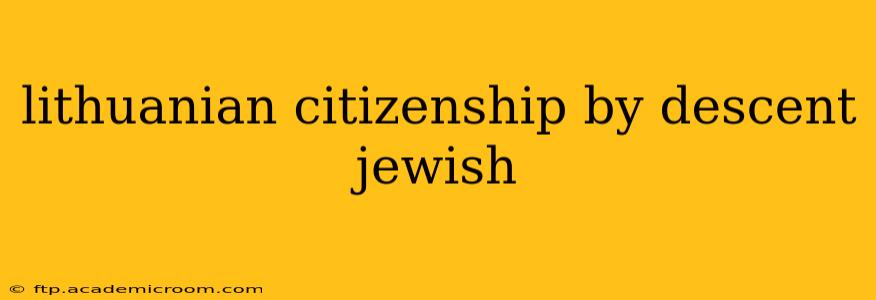Obtaining Lithuanian citizenship can be a complex process, particularly for those claiming descent. This guide focuses specifically on Lithuanian citizenship by descent for individuals of Jewish heritage, addressing common questions and navigating the intricacies of the legal requirements. Understanding the historical context and the specific documentation needed is crucial for a successful application.
What are the Requirements for Lithuanian Citizenship by Descent for Jews?
The primary requirement is demonstrating unbroken descent from a person who was a Lithuanian citizen before the loss of Lithuanian independence (generally considered to be before 1940). This means providing documented evidence of a continuous lineage connecting you to an ancestor who possessed Lithuanian citizenship prior to this date. The specifics of what constitutes sufficient proof are discussed further below. Being of Jewish heritage itself is not a direct path to citizenship; it's the proven Lithuanian citizenship of your ancestor that matters.
How Can I Prove My Lineage?
This is arguably the most challenging aspect of the process. You'll need to meticulously gather and organize genealogical documents. This may include:
- Birth certificates: These should trace your family line back to your ancestor who held Lithuanian citizenship before 1940. Certificates must be original or certified copies, ideally translated into Lithuanian.
- Marriage certificates: These are essential to establish family links across generations. Again, original or certified copies, and potentially translations, are necessary.
- Death certificates: These documents help confirm the timeline of your family's history.
- Census records: These can be invaluable in verifying family relationships and residence in Lithuania during the relevant period.
- Passport or citizenship documents: If you can locate any passport or citizenship documents belonging to your Lithuanian ancestor, these would be strong supporting evidence.
- Military records: If your ancestor served in the Lithuanian military, these records can be helpful.
What if My Ancestors' Records Are Missing or Damaged?
The absence of certain documents can significantly complicate the process. If you encounter gaps in your family history, you should explore alternative avenues for establishing your lineage. This may involve:
- Searching Lithuanian archives: The Lithuanian State Archives may hold vital records, but searching these archives can be time-consuming and requires familiarity with Lithuanian language and archival practices.
- Consulting genealogists: Professional genealogists specializing in Lithuanian records can significantly aid your research, though their services come at a cost.
- Reaching out to family members: Contacting relatives who may possess relevant documents or knowledge of your family history is crucial.
What if My Ancestor Was Deported or Lost Their Citizenship?
Circumstances such as forced deportations or loss of citizenship due to political events during World War II and its aftermath may require careful attention. You will need to demonstrate that your ancestor’s loss of citizenship was involuntary and did not constitute a voluntary renunciation. This often requires supplementary documentation to support this claim.
What Language Are the Documents Submitted In?
While some flexibility might exist, it's highly recommended to submit all documents in Lithuanian or accompanied by certified translations into Lithuanian. This significantly simplifies the process and reduces the potential for delays or rejections.
How Long Does the Process Take?
The processing time for Lithuanian citizenship applications varies considerably, ranging from several months to even a few years. Thorough preparation and meticulous documentation significantly increase the chances of a smoother and faster process.
Where Can I Find More Information?
The official website of the Lithuanian government's migration department provides the most accurate and up-to-date information on citizenship applications. However, it's often beneficial to consult with a lawyer specializing in Lithuanian immigration law for personalized guidance.
This guide provides a general overview. The specific requirements and procedures may change. Always consult the most current official sources and seek professional legal counsel for personalized advice tailored to your individual circumstances. Remember, thorough preparation and accurate documentation are key to a successful application.
